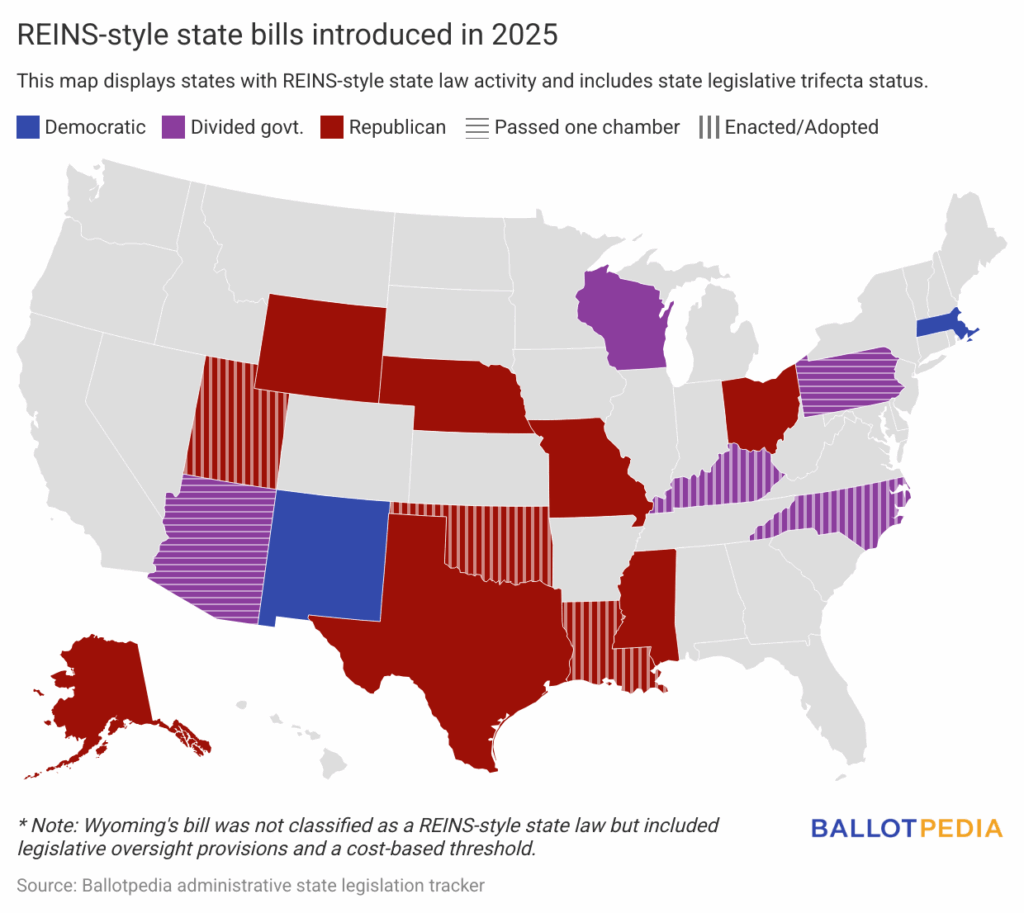On July 29, both houses of the North Carolina legislature voted to override a gubernatorial veto, passing House Bill 402 into law. HB 402 shares features with the proposed federal-level REINS Act, by requiring legislative approval of agency rules that exceed a cost threshold.
North Carolina Gov. Josh Stein (D) vetoed HB 402 on June 27. On July 29, the state House of Representatives voted 73-47 to override Gov. Stein’s veto, with two Democrats joining with Republicans in voting for the override. Later that day, the state Senate voted 30-19 along party lines to override the veto, passing the bill into law. The Senate originally voted 26-17 to pass the bill on June 10, and the House originally passed it 70-44 on June 17. A veto override in North Carolina requires a three-fifths supermajority vote in both chambers, which is 72 votes in the House and 30 votes in the Senate. Three House Democrats—Reps. Cecil Brockman, Carla Cunningham, and Shelly Willingham—originally voted in favor of HB 402 on June 17. Brockman voted against the veto override on July 29. Cunningham and Willingham voted in favor of the veto override.
Under HB 402, proposed permanent rules expected to cost $20 million or more over a five-year period must be approved by the legislature to take effect. The bill also adds requirements for multi-member bodies like boards and commissions to propose permanent rules: two-thirds of commissioners must vote to approve a rule expected to cost $1 million or more over a five-year period; for rules costing $10 million or more, a unanimous vote is needed. The bill included an exception to all of these requirements for rules necessary to comply with federal requirements.
Speaking in support of the override vote, Pacific Legal Foundation’s Jaimie Cavanaugh said that “creating a legislative review process for new regulations will ensure that state agencies continue to work for and represent the will of those who elected them.” In his veto press release, Gov. Stein said that the bill “would impose red tape, including an unworkable unanimity requirement, that would hamstring the decision-making of agencies, boards, and commissions, making them less effective at protecting people’s health, safety, and welfare.”
What’s the background?
The House had a Republican veto-proof supermajority from April 2023 to January 2025. Republicans gained their veto-proof supermajority in the House when Rep. Tricia Cotham (D) switched parties from Democratic to Republican in 2023, giving Republicans 72 seats out of 120. Republicans gained a veto-proof supermajority in the Senate in the 2022 election, going from 28 to 30 seats out of 50. The legislature overrode all 27 vetoes by former Gov. Roy Cooper (D) in 2024.
In the November 2024 elections, Republicans lost one vacant seat in the House, which ended their supermajority. Republicans retained control of 30 Senate seats in the 2024 elections.
The July 29 vote makes North Carolina the fifth state to pass a REINS-like bill into law in 2025 and the second to do so by veto override. The governors of Utah, Oklahoma, and Louisiana signed REINS bills into law earlier in the year, and the Kentucky legislature overrode Gov. Andy Beshear’s (D) veto to pass a REINS bill into law on March 27.
In addition to these five states, Wyoming also passed a legislative oversight bill by veto override in 2025. The Wyoming bill was introduced as a REINS-style law, and the final version passed into law contained a cost threshold for rules similar to REINS. Because the final version of the Wyoming bill does not require legislative action on the rules before they go into effect (instead allowing the legislature to pass legislation prohibiting their implementation), Ballotpedia does not classify this as a REINS-style law.
Nine states have passed laws that Ballotpedia classifies as REINS-style, beginning with Florida in 2010. Four of the nine were passed through veto overrides.
In 2025, Ballotpedia tracked 27 REINS-style state laws or other laws creating cost threshold-based legislative oversight in 17 different states.

Additional reading:



